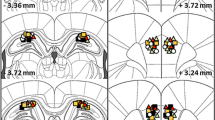Abstract
Since the hippocampus is likely to be a major site of phencyclidine (PCP) action, the effects of various doses of PCP (1.8, 18 or 36 nM) as well as 3.6 nM MK-801 or saline injected directly into the dentate gyrus of the hippocampus was tested for acquisition of a spatial navigation task (dry land version of a water maze) using a paradigm that assesses short term memory based on learning within a day and long term memory based on learning between days. Results indicated that relative to saline or 1.8 nM PCP injected rats, rats with 18 or 36 nM PCP or 3.6 nM MK-801 injections were impaired in acquisition of the task as measured by increased distances traveled to find the food location between days but not within days. In additional experiments 36 nM PCP or 3.6 nM MK-801 did not produce any deficits in the acquisition of an object discrimination task. It is suggested that PCP through its blocking action of the NMDA receptor in the dentate gyrus or CA1 region of the dorsal hippocampus mediates the consolidation of new spatial location information.
Similar content being viewed by others
References
Bourne GW, Capek R, Esplin B (1989) Phencyclidine suppresses hippocampal long-term potentiation through stereospecific activation of phencyclidine receptors. Neuropharmacology 28:49–56
Butelman ER (1989) The effect of NMDA antagonists in the radial arm maze task with an interposed delay. Pharmacol Biochem Behav 35:533–536
Ericson E, Ahlenius S (1990) Phencyclidine-induced disruption of an aversely motivated two-choice successive discrimination in the rat. Psychopharmacology 102:171–174
Handelmann GE, Contreras PC, O' Donohue TL (1987) Selective memory impairment by phencyclidine in rats. Eur J Pharmacol 140:69–73
Honey CR, Miljikovic Z, MacDonald, JF (1985) Ketamine and phencyclidine cause a voltage-dependent block of responses tol-aspartic acid. Neurosci Lett 61:135
Kesner RP, Dakis M (1993) Phencyclidine disrupts acquisition and retention performance within a spatial continuous recognition memory task. Pharmacol Biochem Behav 44:419–424
Kesner RP, Hardy JD, Novak JM (1983) Phencyclidine and behavior: II. Active avoidance learning and radial arm maze performance. Pharmacol Biochem Behav 18:1057–1063
Kesner RP, Dakis M, Bolland, B (1993) Phencyclidine disrupts long-but not short-term memory within a spatial learning task. Psychopharmacology 111:85–90
Lynch G, Baudry M (1984) The biochemistry of memory: a new and specific hypothesis. Science 224:1057–1063
Maragos WF, Penney JB, Young AB (1988) Anatomic correlation of NMDA and3H-TCP-labeled receptors in rat brain. J Neurosci 8:493–501
Martin D, Lodge D (1985) Ketamine acts as a non-competitiveN-methyl-d-aspartate antagonist on frog spinal cord in vitro. Neuropharmacology 24:99
Martin P, Manning M, Norman C (1985) Effects of phencyclidine on active avoidance and escape in rats. Psychopharmacology 86:237–240
McCann DJ, Winter JC (1986) Effects of phencyclidine,N-allyl-N-normetazocine (SKF-10,047) and verapamil on performance in a radial maze. Pharmacol Biochem Behav 24:187–191
Monaghan LT, Cotman CW (1985) Contribution ofN-methyl-d-aspartate-sensitivel-[3H]glutamate-binding sites in the rat brain. J Neurosci 5:2909–2919
Morris R (1984) Development of a water-maze procedure for studying spatial learning in the rat. J Neurosci Methods 11:47–60
Morris RGM, Anderson E, Lynch GS, Baudry M (1986) Selective impairment of learning and blockade of long-term potentiation by anN-methyl-d-aspartate receptor antagonist, AP5. Nature 319:774–776
Paxinos, G, Watson, C (1986) The rat brain in stereotaxic coordinates, 2nd edn. Academic Press, Orlando, Fla.
Pontecorvo MJ, Clissold DB, White MF, Ferkany JW (1991)N-Methyl-d-aspartate antagonists and working memory performance: comparison with the effects of scopolamine, propranolol, diazepam, and phenylisopropyladenosine. Behav Neurosci 105:521–535
Quirion R, Hammer RP, Herkenham M, Pert CB (1981) Phencyclidine (angel dust)/sigma “opiate” receptor: visualization by tritium-sensitive film. Proc Natl Acad Sci USA 78:5881
Sircar R, Zukin SR (1985) Quantitative localization of [3H]TCP binding in rat brain by light microscopy autoradiography. Brain Res 344:142–145
Stringer J, Guyenet PG (1983) Elimination of long-term potentiation in the hippocampus by phencyclidine and ketamine. Brain Res 258:159–164
Thompson DM, Moerschbaecher JM (1984) Differential effects of phencyclidine and MDA on complex operant behavior in monkeys. Pharmacol Biochem Behav 21:453–457
Thompson DM, Mastropaolo J, Winsauer PJ, Moerschbaecher JM (1986) Repeated acquisition and delayed performance as a baseline to assess drug effects on retention in monkeys. Pharmacol Biochem Behav 25:201–207
Thompson LT, Moskal JF, Disterhoft JF (1993) Hippocampus dependent learning facilitated by a monoclonal antibody ord-cycloserine. Nature 359:638–641
Vincent JP, Kartalovski B, Geneste P, Kamenka JM, Lazdunski M (1979) Interaction of phencyclidine (“angel dust”) with a specific receptor in rat brain membranes. Proc Natl Acad Sci USA 76:4678–4682
Zukin SR, Fitz-Syage ML, Nichtenhauser R, Zukin RS (1983) Specific binding of [3H] phencyclidine in rat central nervous tissue: further characterization and technical considerations. Brain Res 258:277–284
Author information
Authors and Affiliations
Rights and permissions
About this article
Cite this article
Kesner, R.P., Dakis, M. Phencyclidine injections into the dorsal hippocampus disrupt long- but not short-term memory within a spatial learning task. Psychopharmacology 120, 203–208 (1995). https://doi.org/10.1007/BF02246194
Received:
Revised:
Issue Date:
DOI: https://doi.org/10.1007/BF02246194




